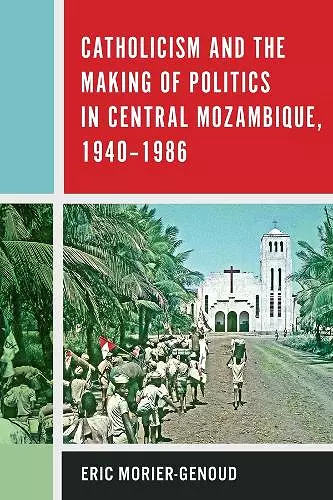Catholicism and the Making of Politics in Central Mozambique, 1940-1986
Format:Hardback
Publisher:Boydell & Brewer Ltd
Published:28th Jun '19
Currently unavailable, and unfortunately no date known when it will be back

Looks at the politics of the Catholic Church during a turbulent period in central Mozambique This book is concerned with the internal diversity and complexity of the Roman Catholic Church. It aims at exploring, unpacking, and explaining how the Roman Catholic institution works, how its politics are made, and how the latter impact its environment. Using the diocese of Beira in central Mozambique as a case study, and following insights by Max Weber, author Eric Morier-Genoud takes the novel "horizontal" approach of looking at congregations within the Church as a series of autonomous entities, rather than focusing on the hierarchical structure of the institution. Between 1940 and 1980, the diocese of Beira was home to some fifteen different congregations rangingfrom Jesuits to Franciscans, from Burgos to Picpus fathers. As in many areas of the world, the 1960s brought conflict to Catholic congregations in central Mozambique, with African nationalism and the reforms of Vatican II playinga part. The conflict manifested in many ways: a bishop's flight from his diocese, a congregation abandoning the territory in protest against the collusion between church and state, and a declaration of class struggle in the church. All of these events, occurring against the backdrop of the war for Mozambican independence, make the region an especially fruitful location for the pioneering analysis proffered in this important study. ERIC MORIER-GENOUD is Senior Lecturer in African History at Queen's University Belfast.
This study is highly recommendable in terms of both content and methodology. * THE ZIMBABWEAN *
Morier-Genoud's study is an important contribution to the historiography of Christianity in the Portuguese empire. [...] This study is a must-read for those seeking to better understand how Catholic diversity shaped the development of Catholic institutions in Central Mozambique. * Religious Studies Review *
In this nuanced investigation of the Roman Catholic Church in Mozambique, Eric Morier-Genoud makes important arguments about the internal diversity and complexity of an institution often considered monolithic and hierarchical. Morier-Genoud's focus on diversity and action rather than on policy allows him to illustrate in rich detail how the church became less hierarchical, more community-oriented, and more prophetic over the course of five decades. * H-AFRICA *
Catholicism and the Making of Politics in Central Mozambique, 1940-1986 could easily be considered part of the major effort made by recent authors to go beyond the simplistic and persistent views normally expressed about the role played by Catholicism and the Catholic Church in African contexts in colonial and postcolonial times and their relationship with the political powers. * E-JOURNAL OF PORTUGUESE HISTORY *
In sum, the book is well-written, saturated with empirical material and extensively drawing on (especially) written sources from many forms of archives. As a whole, the book also reflects Morier-Genoud's long-term, wideranging and rigorous engagement with social, political and religious dimensions of Mozambique's turbulent history. * SOCIAL SCIENCES AND MISSIONS *
Eric Morier-Genoud has given us a lot to think about in this book. * Canadian Journal of African Studies / Revue canadienne des études africaines *
This book illustrates the importance of attending to nuance, tension, and division, all while answering the significant empirical question of how and why Catholicism embedded itself in Mozambique so quickly and so thoroughly in the late colonial and early independence periods. It is an important and informative book that deserves a wide audience. * Church History *
Catholicism and the Making of Politics in Central Mozambique, 1940-1986 makes a crucial point in brilliant fashion. Far from being the monolithic entity that scholars often assume it to be, the Catholic Church is in fact a complex array of elements that have considerable autonomy stemming from cultural, historical, national, and sociological factors, an autonomy that can put them at considerable variance. Eric Morier-Genoud illustrates this in the case of Mozambique, from impressive research conducted over many years, on different continents and in a variety of languages. I recommend Catholicism and the Making of Politics whole-heartedly.-Paul Gifford, University of London * . *
ISBN: 9781580469418
Dimensions: unknown
Weight: 244g
264 pages